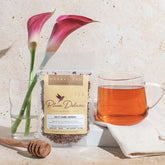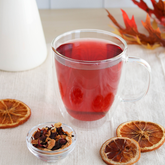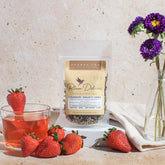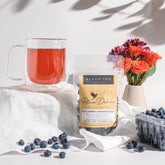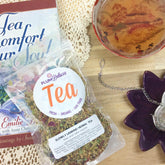I know we’ve all wondered at one point or another about the water we drink. Distilled water, filtered water, or spring water – which is best? I know I have preferences when it comes to drinking water without my taste buds picking up on any of those unwanted funky flavors.
With these many water options and questions looming, we are going to be exploring the use of distilled water for tea, as well as others, so we can gain a bit more clarity on what water is best for our teas. Let’s dive in!
Is Distilled Water Worth It?
Is distilled water best for tea? I will self-admit, I did not know the "right" answer to this question until I began further exploration into it. As a matter of fact, distilled water should not be used for brewing tea. There are many reasons, but let’s cover the basics of water together.
A little refresher from middle school science class: Water, or H2O, sits on a sliding scale. The pH level of pure water is 7. Ideally, the pH range for your water should be 6-8.5 for your home use and for drinking water.
Water with a pH below 6 becomes more acidic, or soft and corrosive. This soft kind of water contains too many metal ions such as iron, manganese, copper, lead, and zinc. This gives the water a metallic taste.
Water that is above 7 becomes more basic, or hard. When this happens, the water can have something called an alkali taste, which would result in a bitter tea. Evidence of hard water in your home could show up as the formation of scale deposits on your dishwasher or in your sink basins.
Distilled water is purified, and by default, we’d assume it should have a pH of 7, but (this part is important), because it reacts with carbon dioxide in the air, the longer the water is exposed to air, the more acidic it becomes. On average, the pH of distilled water will be around 5.8 depending on how long it’s been exposed to the air. The acidity also changes with temperature, and boiling your water only increases this. Remember discussing this earlier? That means your water will taste very metallic if you boil up a pot of distilled water for your tea.
Who wants tea that has a strong metallic aftertaste? Not me! I want the good stuff. The "hit your palate, off into a dream" sort of taste.
This is where we’ll take our next discussion to: Is purified or filtered best? Let’s find out!

Water, Water Everywhere
Yes, this is quite a bit of water talk, but who knew it really does make a difference? We all do now! We’re going to take a closer look at whether filtered water or spring water is best for your tea.
Filtered water – the stuff out of your faucet or fridge – is water that has been run through a filtration system that removes the extra metals which make your water too soft as well too many minerals that make your water too hard. This type of water works fine for boiling and brewing tea; however, you will want to make sure your water is freshly filtered to ensure the best taste for your tea. You can’t go wrong with this option, as long as you ensure your filtration system is on par and ready for brewing!
Bottled spring water, or artesian water, ideally with a pH of 7, is the cream of the crop for brewing tea. Spring water comes directly from a natural source – an underground aquifer – which naturally filters the water through underground rocks. This natural type of filtration process keeps just the right balance of minerals. Well water is included in this category – the reason I’m so in love with our water here at our home, which sits atop a high hill overlooking a river below. The best of our earth’s natural filtration system!

Which Tea is Best for Your Water?
I’d like to mention a few teas I thoroughly enjoy and that you can still embrace whether you have hard water or soft water.
When it comes to hard water, choosing a black tea is great. You’ll want to avoid a green or oolong tea as the hardness of the water will mask some of the beautiful subtle notes in these teas. You’ll also want to make sure you don’t over brew your tea in hard water, otherwise you will end up with a very bitter tea.
For hard water, I recommend trying Plum Deluxe’s Wonder-Full Pomegranate decaf black tea with pomegranate and raspberry. This tea is a unique blend of tart fruits and earthy florals that is sure to quench your thirst.
Another great choice is Mindful Morning Blend, which is an Earl Grey. What’s great about this tea is that you are already starting off with water that can dull the flavors in lighter teas. Thankfully, Earl Grey on its own is filled with strong and citrusy flavors that will jive just right with your hard water.
For soft water, it’s a bit easier to brew tea, even with the slightly ‘saltier’ flavor your taste buds may pick up. Green, herbal, and oolong teas are much better suited for soft water, as the aromatic aspects and layered flavors are brought out well.
Yet another tea that I get just giddy over is the Hope Blend green tea with jasmine. This tea is made with a fresh blend of jasmine flowers, buds, and cornflowers for a pop of color. It is soft, sweet, lingering, and simply the perfect complement to any part of your day.

![Snow Day Sips Winter Tea Variety Pack [6-Pack of Flavors]](http://www.plumdeluxe.com/cdn/shop/files/holidayTeaVarietyPack_3.png?v=1766043158&width=165)
![Slow Living Tea Variety Pack [6-Pack of Flavors]](http://www.plumdeluxe.com/cdn/shop/files/holidayTeaVarietyPack_2.png?v=1766042814&width=165)


